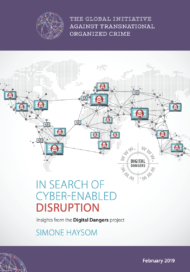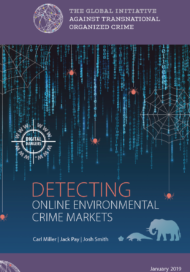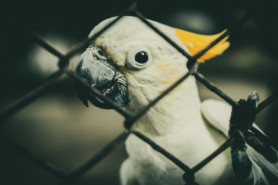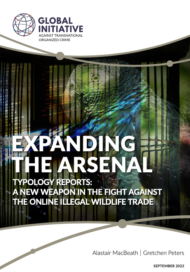Posted on 19 Aug 2021
The Market Monitoring and Friction Unit (MMFU) is a new team within the Global Initiative Against Transnational Organized Crime (GI-TOC) dedicated to monitoring illegal trade in endangered wildlife species on the internet and working towards catalyzing innovative, effective strategies to disrupt it.
We are in the midst of what is being termed ‘the sixth mass extinction’ – in which the current rate of species extinction is estimated to be between 100 and 1 000 times greater than natural extinction rates. Within the range of devastating human activities causing this, illegal wildlife crime poses a devastating threat to the biosphere – and more. Poaching, transport and storage of live animals heightens risk of outbreaks of zoonotic diseases, while encouraging corruption and enriching highly organized criminal networks.
Websites on the open web – sites that people can access and use every day – host some of the biggest online markets for endangered species. Traffickers use social media to advertise shipments to buyers, and take advantage of encrypted messaging channels to arrange transactions. Evidence of wildlife crime is widespread on the internet and private platforms, and law enforcement agencies, generally, are either unwilling or unable to mount an adequate response.
The rationale behind the MMFU
The aim of the MMFU is to make the open web a space where wildlife criminals cannot operate. Stopping the illegal wildlife trade, and the various actors along the supply chain who profit from it, is an essential part of the broader fight to protect the environment and human lives, while reducing the risk of crime-related corruption.
The challenge is that the online trade in endangered species is easily overlooked, leaving a gap in the global response that allows wildlife traders to openly seek customers online, market goods, conduct transactions and stimulate demand.
This mirrors a broader challenge in combating cyber-enabled crime – namely that criminals are on the web, but the police are not. Reasons for this are complex, partly to do with the rapid growth of for-profit tech companies that have resisted regulation and have few legal regulatory burdens, something that has shaped the broader commercial ecosystem. The challenge is also linked to a global failure to deal with growing levels of cybercrime. Cyber enforcement units are mostly under-resourced, often lack explicit, adequate mandates and face complex challenges dealing with technologies like encryption.
In addition, this situation manifests unequally around the world. While rich countries have the largest internet-using populations, they also have the most resources to combat online harms. The greatest challenges are found in developing countries with the least resources to tackle these problems.
From various perspectives – the inequities in dealing with cybercrime, the human harms associated with organized wildlife crime, and its role in the global biodiversity crisis – this is a global development issue of increasing importance.
What is the MMFU doing?
The GI-TOC’s investigation into illicit online trade in endangered species grew from the recognition that innovative responses were needed to combat this type of crime. This work began in 2018 with the ‘Digital Dangers’ project, funded by the Norwegian government, which laid down the evidence base and technology pilot that underpins our current strategy and work.
The MMFU’s work encompasses various activities. In partnership with the Centre for the Analysis of Social Media, the unit makes use of a machine-learning tool – ‘the Cascade’ – to monitor markets and release reports on the trends we observe in online trade, as well deeper-dives into the dynamics of how traffickers, traders and consumers use online spaces to connect, market their goods or transact. We also publish ‘tools’ – methodologies or practical advice on how to monitor or disrupt the online trade – which we hope other organizations will find useful. You can find these tools, as well as trend reports and blogs, which aim to share these insights, on our website.
Creating ‘market friction’
A lot goes on behind the scenes too. The GI-TOC is developing our OSINT (open source intelligence tools) capacity, so that we can follow online leads and put them to use in the unit’s investigations . The MMFU shares actionable intelligence with trusted law enforcement officials and our findings are shared with tech companies about the ways their platforms or algorithms can encourage illicit trade.
Besides encouraging and supporting the private sector and law enforcement, the unit is also thinking about ways in which it can intervene to undermine illicit online trade – for example, by undermining consumers’ trust in traders, or creating greater costs for traders if they use these platforms. We call this introducing ‘market friction’.
However, the GI-TOC believes that any meaningful, sustainable interventions to make the internet a difficult place for wildlife criminals to operate in will happen only when the entire environment regulating online activity shifts up a gear. We therefore advocate better overall regulation of the internet, so that it works to protect ordinary people and does not encourage cyber-criminal exploitation of endangered species.
All of this is impossible to do alone, and the GI-TOC collaborates widely with civil society organizations, academic institutions, the private sector and the authorities. We are incredibly grateful for their support. Current projects are based on dynamic collaborations with the Zoological Society of London, Legal Atlas, ACCO, The World Parrot Trust, Save Vietnam’s Wildlife and academics at the University of Oxford, and we are engaging with regional and international e-commerce and social media companies, like Jumia and Facebook.
If you are interested in joining forces, please get in touch at mmfu@globalinitiative.net. If you would just like to follow the journey, you can keep track of our publications and events by following the GI-TOC on social media or by visiting our website.



